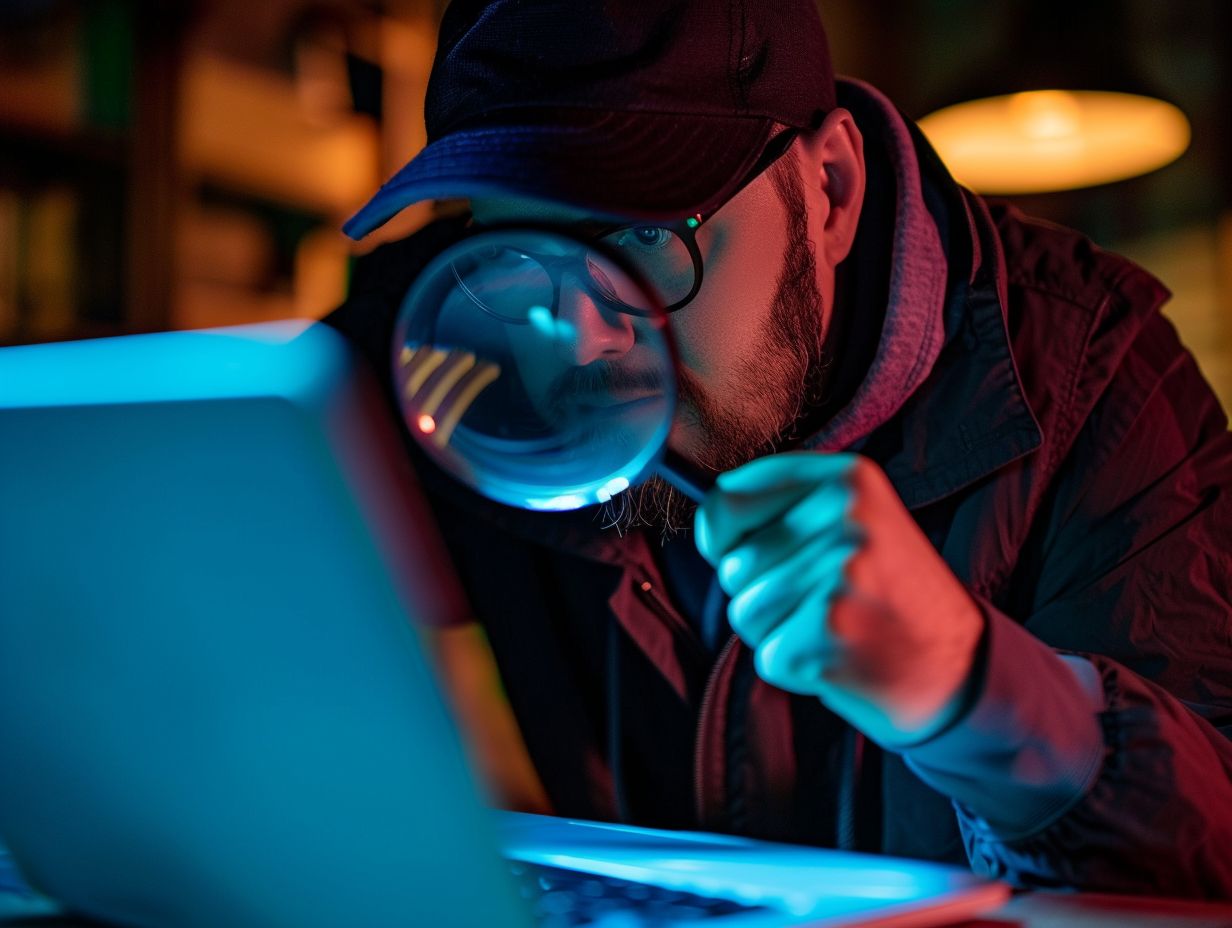Are you intrigued by the world of digital forensics and cybersecurity? Take a deep dive into EC-Council’s Certified Hacking Forensic Investigator (CHFI) certification to gain insights.
Explore the significance of digital forensics, the essential skills and knowledge necessary for CHFI professionals, the certification procedure, the tools and techniques utilized in digital forensics, practical applications of CHFI, and the promising career pathways within this domain.
Join the conversation as we delve into the realm of mastering digital forensics with CHFI!
Key Takeaways:

The Role of a Certified Hacking Forensic Investigator (CHFI)
A Certified Hacking Forensic Investigator (CHFI) is essential in investigating cybercrimes by meticulously analyzing and preserving digital evidence to uncover the truth behind malicious activities and security breaches.
This responsibility requires the use of advanced tools and techniques to identify and document electronic data that can serve as critical evidence in legal proceedings. The process of digital evidence analysis is crucial for comprehending the tactics employed by cybercriminals and tracing their activities back to the origin.
By conducting a thorough examination of digital footprints, a CHFI can reconstruct the sequence of events, establish timelines, and offer valuable insights into the nature of the cyber threat. This detailed work is vital for law enforcement agencies and organizations to construct strong cases and enhance cybersecurity measures.
Understanding the Importance of Digital Forensics
In modern investigations, digital forensics plays a crucial role. Professionals in this field use advanced tools and techniques to recover, analyze, and present digital evidence accurately and with integrity.
When you engage in digital forensics, you have the opportunity to uncover essential details that may have remained hidden otherwise. This process offers valuable insights into cybercrimes and aids in identifying those responsible. Evidence recovery entails gathering data from various sources like computers, mobile devices, and networks, followed by a meticulous analysis to reconstruct the sequence of events. Cyber forensics experts are instrumental in protecting digital information by leveraging their expertise to prevent cyber-attacks, safeguard sensitive data, and uphold the integrity of digital systems.
Skills and Knowledge Required for CHFI
To excel as a CHFI, you need to possess a blend of technical prowess and analytical skills, coupled with in-depth knowledge of forensic tools and methodologies required for investigating cyber incidents effectively.
Professionals in this field must exhibit a strong understanding of network security protocols, data recovery techniques, and digital evidence preservation methods. Proficiency in conducting thorough malware analysis, interpreting log files, and performing memory forensics is crucial for CHFI experts. Specialized skills like steganography detection and mobile device forensics further enhance their investigative capabilities. Obtaining the CHFI certification demands practical experience in evidence handling, legal procedures, and courtroom testimony to validate findings effectively and ethically.
Technical and Analytical Abilities
To conduct thorough investigations, perform malware analysis, and effectively respond to incidents in the constantly changing landscape of cyber threats, CHFI professionals must have strong technical and analytical skills.
These professionals need to demonstrate proficiency in utilizing tools such as EnCase, FTK, and Wireshark to extract digital evidence, detect breaches, and analyze network traffic patterns. They must also have a solid understanding of file systems, memory forensics, and registry analysis to reconstruct the sequence of cyber incidents.
Proficiency in log analysis, network forensics, and memory dumping techniques enables CHFI professionals to identify irregularities and trace back malicious activities. Their role in incident response is critical during security breaches, as they work diligently to contain the threat, minimize the impact, and restore compromised systems.
The CHFI Certification Process

The CHFI certification process, administered by EC-Council, involves a rigorous examination that evaluates your expertise in digital forensics, cybercrime investigation, and the use of forensic tools to combat contemporary cyber threats.
To pursue the CHFI certification, you must meet specific eligibility criteria established by EC-Council. These requirements typically include a background in information security or a related field, as well as successful completion of official CHFI training. The examination format consists of multiple-choice questions and practical hands-on challenges designed to assess your knowledge and skills.
Earning the CHFI certification not only boosts your credibility in the digital forensics domain but also creates new career prospects in sectors like law enforcement, government agencies, and private cybersecurity firms.
Eligibility and Exam Details
To earn the prestigious CHFI certification from EC-Council, aspiring professionals like you must meet specific eligibility criteria and successfully pass a rigorous examination. This certification validates your expertise in digital forensics and cybercrime investigation.
Candidates seeking the Certified Incident Handler: Digital Forensics Fundamentals certification typically need a background in information security, computer forensics, or a related field. Additionally, they should have a solid understanding of various cyber threats and investigative techniques.
The examination for the CHFI certification includes multiple-choice questions and practical scenarios that evaluate your knowledge and skills in forensic analysis, evidence handling, and report writing. EC-Council’s thorough evaluation process ensures that only individuals with a comprehensive understanding of digital forensics and a commitment to ethical standards receive the CHFI certification.
Tools and Techniques Used in Digital Forensics
You, as a digital forensics professional, leverage a diverse array of forensic tools and cutting-edge techniques to conduct in-depth investigations. These investigations include malware analysis, network forensics, IoT threat detection, and cloud forensics, allowing you to effectively uncover cyber threats and security breaches.
In your line of work, you often employ a range of methodologies such as disk imaging, memory analysis, and network packet analysis to gather evidence in a forensically sound manner. When dealing with malware analysis, forensic tools are crucial for dissecting malicious code, identifying patterns, and determining the impact on the target system.
Network forensics requires tools like Wireshark and Tcpdump for analyzing network traffic and pinpointing any suspicious activities. As more data is stored in the cloud, cloud forensics has become increasingly vital, necessitating specialized techniques to investigate incidents. Additionally, with the rise of IoT devices, digital forensics now extends to IoT forensics, focusing on retrieving and analyzing data from interconnected smart devices.
Overview of Commonly Used Tools
Commonly used tools in digital forensics include specialized software for malware analysis, network forensics platforms for traffic monitoring and analysis, and IoT threat detection tools that enable you to identify vulnerabilities in connected devices and systems.
These tools play a crucial role in the field of digital investigations, aiding forensic experts in examining digital evidence to uncover important insights.
Malware analysis tools assist you in dissecting malicious software to understand its behavior and impact on systems.
Network forensics platforms allow you to monitor network traffic, detect anomalies, and trace potential security breaches.
IoT threat detection software is vital in safeguarding against risks posed by interconnected devices, detecting unauthorized access or data breaches in IoT ecosystems.
Real-World Applications of CHFI
The real-world applications of CHFI certification are vast, with professionals like you utilizing their expertise in conducting cyber investigations, performing incident response activities, and presenting digital evidence in legal proceedings. CHFI professionals serve as valuable assets in safeguarding digital ecosystems from the ever-evolving landscape of cyber threats.
Your role as a CHFI professional is critical in identifying and analyzing potential security breaches, assisting organizations in mitigating risks and preventing future incidents. By leveraging forensic tools and methodologies, you can proficiently collect, preserve, and examine digital evidence to uncover malicious activities and trace cybercriminals. Your expertise plays a pivotal role in ensuring a comprehensive investigation process and presenting credible findings in court. This contributes to the prosecution of offenders and enhances cybersecurity measures across various industries.
Examples of CHFI in Action

CHFI professionals demonstrate their expertise in cybersecurity and incident response by addressing complex cases involving data breaches, malware infections, and illicit activities on the Dark Web, illustrating the practical application of digital forensics in combating cyber threats.
These professionals play a critical role in responding to data breaches by conducting thorough investigations to determine the origin of the breach and the extent of the data compromise. For instance, they may examine network logs, analyze system memory, and recover deleted files to reconstruct the series of events that led to the breach.
During Dark Web investigations, CHFI experts utilize their skills to locate illegal activities such as the trafficking of stolen data or illicit materials. Their forensic examinations often produce valuable evidence that can aid in legal proceedings against cybercriminals and enhance organizations’ security measures.
Career Opportunities for CHFI Professionals
Obtaining a CHFI certification can unlock a range of career prospects for you within the cybersecurity domain. This certification can prepare you for roles such as forensic analysts, incident responders, and cyber security specialists, all of which offer competitive salaries and promising growth opportunities in the constantly evolving digital realm.
Individuals holding a CHFI certification have the advantage of pursuing diverse career paths. They can find employment in law enforcement agencies, government entities, financial institutions, or private cybersecurity companies. Forensic analysts, for example, are tasked with examining digital evidence to resolve cybercrimes. Incident responders are pivotal in responding to security incidents, detecting vulnerabilities, and implementing preventive measures. Cyber security specialists, on the other hand, concentrate on devising strategies to safeguard networks and systems from cyber threats. These roles not only come with financial incentives but also provide avenues for continuous learning and professional development.
Potential Job Roles and Salaries
As a CHFI professional, you can pursue a rewarding career path in roles such as forensic analyst, cyber security specialist, or incident responder. These positions offer competitive salaries that align with the demand for expertise in digital forensics and cybercrime investigation.
Forensic analysts are instrumental in examining digital evidence to identify cyber threats and illicit activities. Cyber security specialists focus on safeguarding systems and networks by implementing robust security measures. Incident responders are tasked with promptly addressing security breaches and cyber incidents to mitigate risks and prevent further harm.
Salaries for CHFI professionals typically range from $70,000 to upwards of $120,000, with the potential for increased earnings based on experience and certifications. Holding a CHFI certification not only confirms proficiency in cyber forensics but also unlocks diverse career opportunities in sectors like law enforcement, government agencies, financial institutions, and private corporations.
Frequently Asked Questions
What is EC-Council’s Certified Hacking Forensic Investigator (CHFI)?
EC-Council’s CHFI is a professional certification program designed to equip individuals with the necessary skills and knowledge to investigate cyber attacks and gather digital evidence for legal proceedings.
What is the role of a Certified Hacking Forensic Investigator (CHFI)?

A CHFI’s primary role is to conduct forensic investigations in cases of cyber attacks or digital crimes. This includes gathering evidence, analyzing data, and presenting findings in a court of law.
What topics are covered in EC-Council’s CHFI: Digital Forensics Mastery program?
The program covers topics such as computer forensics, mobile device forensics, network forensics, malware analysis, and incident response. It also includes hands-on training on various tools and techniques used in digital forensics investigations.
Who can benefit from becoming a Certified Hacking Forensic Investigator (CHFI)?
Professionals in the fields of law enforcement, information security, and digital forensics can benefit from becoming a CHFI. This certification is also valuable for individuals working in IT or cyber security roles.
What are the prerequisites for taking the CHFI: Digital Forensics Mastery program?
To enroll in the CHFI program, individuals should have at least two years of experience in information security, digital forensics, or IT. They should also possess a basic understanding of operating systems, networks, and cyber security concepts.
How can I prepare for EC-Council’s CHFI: Digital Forensics Mastery exam?
EC-Council offers official training courses and study materials to help individuals prepare for the CHFI exam. These resources cover all the topics and tools included in the exam, and can be accessed online or through authorized training centers.
